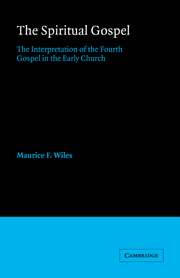Book contents
- Frontmatter
- Contents
- ACKNOWLEDGEMENTS
- ABBREVIATIONS
- INTRODUCTION Commentaries and commentators
- I The authorship and purpose of the Gospel
- II The Fourth Gospel and the Synoptic Gospels
- III Historicity and symbolism
- IV The signs
- V Leading ideas of the Gospel
- VI The Fourth Gospel and the Gnostics
- VII Christological interpretation in the third and fourth centuries
- VIII The Christological exegesis of Theodore and Cyril
- IX The Gospel of salvation
- EPILOGUE An assessment
- BIBLIOGRAPHY
- INDEX OF PROPER NAMES
- INDEX OF TEXTS
III - Historicity and symbolism
Published online by Cambridge University Press: 06 March 2010
- Frontmatter
- Contents
- ACKNOWLEDGEMENTS
- ABBREVIATIONS
- INTRODUCTION Commentaries and commentators
- I The authorship and purpose of the Gospel
- II The Fourth Gospel and the Synoptic Gospels
- III Historicity and symbolism
- IV The signs
- V Leading ideas of the Gospel
- VI The Fourth Gospel and the Gnostics
- VII Christological interpretation in the third and fourth centuries
- VIII The Christological exegesis of Theodore and Cyril
- IX The Gospel of salvation
- EPILOGUE An assessment
- BIBLIOGRAPHY
- INDEX OF PROPER NAMES
- INDEX OF TEXTS
Summary
THE PROBLEM OF HISTORICITY
One of the bewildering features of modern Johannine studies is the radically divergent answers that are given to the question of the historical character of the book. While one interpreter may regard it as the romantic creation of the mystical imagination, another believes it to be absolutely rooted and grounded in history. The cleavage of opinion does not find such violent expression in the early centuries, but nevertheless it is already present. The only early writers who accept at all the possibility of there being differing degrees of historicity attaching to different parts of the scriptural record are, as we have seen, Origen and Theodore. The two stand in opposing camps in their assessment of the Gospel's historicity. For Origen the Gospel has a special admixture of the unhistorical. For Theodore it has the greatest historical reliability as a firsthand account.
Origen was always on the alert to find a deeper meaning in the words of Scripture. When Heracleon gives simply the natural straightforward meaning of a text, Origen's repeated criticism is that this is πολύ ἁπλούστερον, that it does not go nearly deep enough. Many incidents are recorded for doctrinal purpose, and not as a strict historical account. He himself, therefore, is always ready to move on to symbolic or allegorical meanings, to the complete exclusion of the historical sense if necessary. No doubt he regarded the bulk of the record as historical and even insists upon its historicity on occasions, but the claim of Père de Lubac that he never denies the literal historical meaning does not seem to stand up to the evidence.
- Type
- Chapter
- Information
- The Spiritual GospelThe Interpretation of the Fourth Gospel in the Early Church, pp. 22 - 40Publisher: Cambridge University PressPrint publication year: 1960



